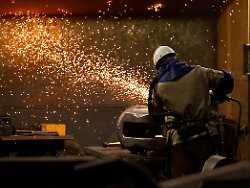recession avoided
Economy hardly grows at the beginning of the year – war slows down recovery
04/29/2022 10:03 am
The German economy returns to growth at the beginning of the year. The recovery is mainly supported by investments. With the beginning of the Russian war, however, any further increase in economic output is practically choked off.
The German economy is treading water at the beginning of the year. According to the Federal Statistical Office, gross domestic product rose by only 0.2 percent in the first three months compared to the previous quarter. The growth was mainly due to higher investments. The trade balance, on the other hand, slowed the recovery. It faltered further with the start of the Russian war in the middle of the quarter.
The feared second negative quarter in a row and with it a so-called technical recession has now failed to materialize. In the final quarter of 2021, economic output in Germany fell by 0.3 percent. If the economy shrinks for two quarters in a row, economists speak of a “technical recession”.
However, the war in Ukraine has dashed hopes of a strong economic recovery in the current year. The economic consequences of the Russian attack on the neighboring country are exacerbating the problems that were already plaguing Europe’s largest economy: above all, sharply rising energy prices and supply bottlenecks for important raw materials and intermediate products.
Economists disagree on spring forecast
In view of the global situation, the mini-growth was still friendly, judges economist Alexander Krieger. “But the export-dependent economy is still not moving. There is no improvement in sight. It looks “strongly as if economic output will fall in the current quarter””
Jörg Krämer from Commerzbank expects stagnation in the coming months. The war is massively unsettling companies and consumers and driving up energy prices. In addition, there is China’s zero corona policy. “If Russian gas supplies were even stopped, the resulting energy crisis would probably cause a deep recession. The economic risks are currently very high.”
On the other hand, Fritzi Köhler from KfW also expects growth in the spring. The recovery of Omikron gives a positive impetus. However, new supply chain bottlenecks weighed on it.
“Economy steers through difficult waters”
Economists had recently lowered their economic forecasts for 2022 in rows. “The German economy is navigating difficult waters and is experiencing the highest inflation rates in decades,” stated leading economic research institutes. They now expect 2.7 percent growth for the year as a whole. In autumn, a plus of 4.8 percent had been predicted. The federal government lowered its growth expectations for the current year from 3.6 percent to 2.2 percent.
The “business wise men” are even more pessimistic. The Federal Government’s advisory body is only forecasting an increase in gross domestic product of 1.8 percent for this year. According to the German Council of Economic Experts, if the supply of energy from Russia were to be stopped, the German economy could even fall into recession.
Last year, the German economy regained its footing after the economic slump in the Corona year 2020 and grew by 2.9 percent. However, the growth was lower than initially hoped. Delivery bottlenecks and material shortages weighed heavily on industry in particular.
